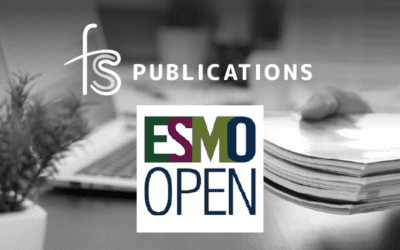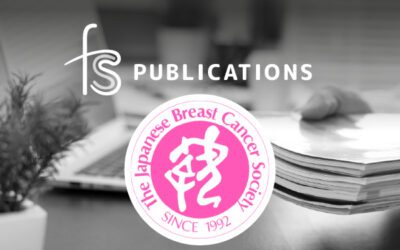At Frontier Science Scotland (FSS), our experience working with a wide range of industry sponsors and pharmaceutical companies spans decades.
While our attitude to serving clients in this sector does not differ from our academic projects, it’s our understanding of both worlds that delivers value for clients.
“We bridge the gap,” says Eric Riley, Head of Development. “Supported by FSS’s diverse portfolio across multiple industry and academic projects, we offer a strong and unique perspective because we understand how both systems work.”
From global pharmaceutical leaders to start-ups, FSS has supported global clinical trials to succeed in bringing life-improving therapeutics to market. Such intricate knowledge of industry sponsors and pharmaceutical companies has fed into FSS’s versatile working model, which – combined with our team’s expertise – makes the organisation well-suited for serving clients in this sector.
Going the extra mile
Flexibility is a critical strength of FSS, according to Robin McConnell, Data Management Team Lead. “When working with our partners, we consider all of their needs and requirements when designing and providing solutions. Launching a trial can be a stressful process for researchers. That’s why we assist by adopting an agile and accommodating approach rather than a one-size-fits-all.”
This was evidenced during the COVID-19 pandemic, which – as was the case for many other clinical research projects across the world – demanded a reassessment of operations in multiple FSS trials, including OlympiA.
“The [FSS] team coordinated data cleaning and statistical analysis while working remotely,” says Robin. “Despite challenges, such as the immediate halting of monitoring and patient visits, all activities were completed on time with a positive result for the study.”
FSS has also agreed to take on additional responsibilities outside the original contract specification for other projects, such as the ALEXANDRA trial.
“We were able to flex and provide additional support that wasn’t in the original scope of the contract,” says Eric Riley, Head of Development. “That strengthened our relationships and proved fruitful for collaboration.”
In another project for a key industry breast cancer trial, we assumed further statistical and data management tasks including statistical monitoring, quality tolerance limits and the management of non-eCRF data.
“The client came to us because they needed a solution. We listened, figured out their needs and said, “Okay, we can do that,”’ says Robin.
Our willingness to take on more responsibilities results in huge internal and external benefits. We invest in upskilling our workforce to meet these new requirements and, in turn, this new expertise transfers to our customers.
“ I think that’s what makes us stand out,” says Eric. “It’s our ability to come up with solutions to problems that aren’t necessarily traditional and to carve out the time and resources to do that.”
Additionally, we also look for opportunities to use this new knowledge to spread the word about clinical trials and educate the public.
Robust relationships at the heart of projects in industry
Understanding a client’s project vision and aims is central to providing actionable, effective solutions. That’s why we prioritise regular contact from a project’s beginning – building collaborations that ultimately deliver high-quality results.
“It’s not just a case of passing information backwards and forwards,” says Robin. “We want to have collaborative conversations via video meetings – and also face to face, where possible – that involve experts in the field from both sides [the sponsor and FSS].”
For the OlympiA project, for example, FSS prioritised regular in-person meetings with key project partners, such as Breast International Group (BIG). This has translated into high-yielding partnerships with sponsor and pharmaceutical companies that go well beyond project lifecycles.
Eric credits FSS’s ability to retain exceptional staff for achieving this.
“Rarely is there any turnover in our teams when dealing with customers over the long term,” he says. “That makes a huge difference in terms of moving the work along and knowing where things are, whereas other CROs have high staff turnover in my experience.”
Robin agrees, stipulating that clients benefit from what he calls our organisation’s ‘corporate memory’ of a trial.
“We regularly get asked ’Why was the study set up in this way? Why was this decision made?’” he says. “And without having to go through our extensive records and the emails from ten years ago, our impressive corporate memory means that one of us can normally remember.”
ARE YOU LOOKING FOR RESPONSIVE, CUSTOMISED AND CONSISTENT DATA MANAGEMENT AND BIOSTATISTICS SOLUTIONS FOR YOUR CLINICAL TRIAL PROJECT?
GET IN TOUCH TO START THE PROCESS.
Publications on Aphinity, ALTTO and OLYMPIA trials
ALTTO | ESMO Open
Final 10-year analysis of the ALTTO trial exploring dual anti-HER2 blockade with lapatinib + trastuzumab compared to trastuzumab alone.
APHINITY | Journal of Clinical Oncology
Adjuvant Pertuzumab and Trastuzumab in Early Human Epidermal Growth Factor Receptor 2-Positive Breast Cancer in the APHINITY Trial: Third Interim Overall Survival Analysis With Efficacy Update
OlympiA results in the subset of patients from Japan
The consistency of results between the subset of patients from Japan and the global OlympiA population supports the clinical benefit of adjuvant olaparib for patients with gBRCA1/2pv and HER2-negative, high-risk eBC in Japan after completion of local treatment and neoadjuvant or adjuvant CT.
Cardiac Safety in the APHINITY trial
ESMO Open has published an article confirming the cardiac safety of adjuvant anti-HER2 treatment with pertuzumab and trastuzumab.
Overall survival in the OlympiA trial
OlympiA demonstrates statistically significant improvement in overall survival with adjuvant olaparib compared with placebo
APHINITY | Annals of Oncology
Adjuvant pertuzumab and trastuzumab in patients with early HER-2 positive breast cancer in APHINITY: 8.4 years’ follow-up








